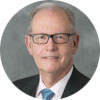Download PDF

As of the date this column was written (March 9), COVID-19 has been identified in 102 countries and community acquired disease has been documented in 35 U.S. states, and this will only increase. What are the implications for Academy members, their staffs, and their practices—and the Academy and its staff? How to be prudent and not panicked?
Ophthalmology has had a singular role in this pandemic. The 34-year-old Wuhan ophthalmologist Li Wenliang, MD, has been hailed in China as a hero for trying to alert authorities to the new virus and its dangers. He was accused by the local Public Security Bureau of “making false comments” that had “severely disturbed the social order” and told to stop. Dr. Li subsequently died of the disease.
The Academy as a science-based organization has been called upon to opine on numerous questions specifically relevant to our members and our profession. We are fortunate to have quite a few colleagues in our profession with special training and expertise in virology and/or public health epidemiology. The questions that they have fielded for the Academy have had to do with everything from disinfection to speed of spread to potential impact on our meetings.
Some of the information will continue to evolve as we all experience the global spread of the COVID-19 infection, its transmission, and its treatment. We’ve begun to understand that a large number of infected individuals remain asymptomatic or are minimally clinically symptomatic. And, specific to ophthalmology, we now recognize that conjunctivitis can be a presenting symptom and that slit-lamp exams (due to facial proximities) create a notable opportunity for transmission.
We now are realizing that the virus may have forever changed our world if it becomes (as some suspect it will) an annual outbreak. We may have to learn to live with it, much as we do with an ever-evolving flu season.
We have already learned not to make desperate purchases of N-95 masks for home use (sometimes at 200 times their usual cost). We will learn not to make draconian decisions about travel. And we may change our habits of human interaction—more fist and elbow bumps and fewer public kisses.
Our clinics and our offices (and the Academy itself) must consider creating plans, policies, and procedures to manage such issues as staff absenteeism due to issues with childcare, ill family members, shutdowns of mass transit, or personal illness. We may have shortages of medication or other necessities as global supply chains are interrupted. We will need to employ evidence-based disinfection protocols, isolate symptomatic individuals, and enact new travel and social distancing protocols. Throughout all of this, we should be guided by the science. The Academy’s coronavirus webpage is updated regularly and is an excellent guide to resources pertaining to the outbreak and specifically ophthalmic practice: aao.org/coronavirus.
I have been asked how the Academy is handling this from a business perspective. Our policies and tactics are informed by science. As an example, we are not hoarding masks. We have encouraged staff not to wear them unless they are ill, and we have requested that all staff who are ill stay home and follow their physicians’ advice regarding testing, self-quarantine, etc. We have emphasized not touching face, nose, and mouth and not using a hand to cover a cough or sneeze. We have educated on proper handwashing and on avoiding hand-to-hand contact. In other words, we are doing all the practical public health things that hopefully all our colleagues are reinforcing.
We also recognize that community-acquired disease may lead us to increase the amount of telecommuting to promote social distancing. We will, however, in such an eventuality, ensure that Academy services to members are uninterrupted.
Finally, about meetings: After the first draft of this article was posted online, based on best-available public health evidence, we postponed the Ophthalmology Business Summit and canceled the Mid-Year Forum. All of our decisions will be frequently reevaluated and guided by public health information. Our primary objective is the safety and well-being of our members. As for AAO 2020 in Las Vegas, we are very fortunate that it happens in mid-November. We should by that time be many months past the U.S. outbreak. I hope that it will be a time to celebrate 2020 The Year of Vision and share what we’ve learned from the tragic epidemic currently in our midst. Be well!